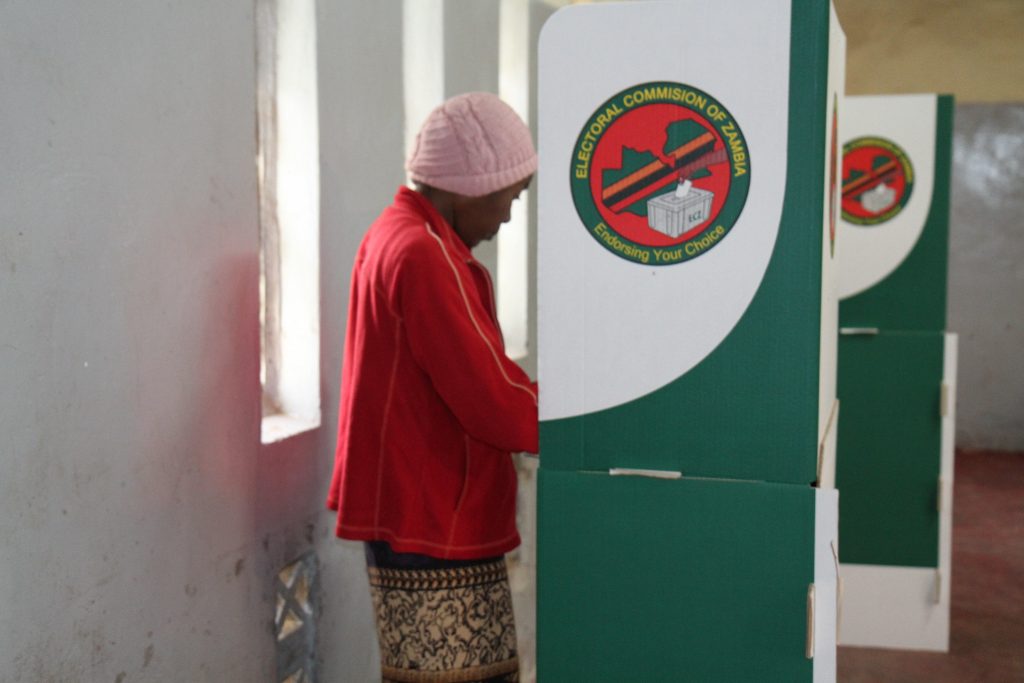Five Things to Watch in the Zambian Elections
Zambia will hold presidential elections on August 12, amidst an ongoing economic crisis and rising political tensions. The election is effectively a two-horse race between President Edgar Lungu and long-time opposition leader Hakainde Hichilema — and like the last election, it is going to be close.
There are already major problems with the polls. Some civil society groups and constitutional lawyers argue that Lungu is not eligible to stand as he has served two terms in office. There are accusations that the government is using Covid-19 social distancing requirements to gain an unfair advantage. And the electoral commission is no longer trusted by large sections of the population.
The good news is that there is a strong international observation presence alongside domestic monitors. In recent elections however, observers have been criticized for failing to identify manipulation. One problem election observers, civil society groups and journalists face is that in poor-quality elections it is not always obvious where to focus attention, and modern elections are often manipulated in advance using slow-burn strategies that are harder to expose.
So what are the five most important things to look out for in the Zambian elections?
1. We don’t know who will be voting
Ahead of the polls the Electoral Commission of Zambia announced that it would be scrapping the existing register. But to cover the country’s nine million eligible voters, the commission allocated just 38 days during the rainy season. Civil society objections were initially disregarded, prompting a group to take the commission to the Constitutional Court in August 2020. Despite the urgency of the application, however, the case is still pending nearly a year later.
There are credible reports of under-registration of voters in pro-opposition regions alongside higher rates in pro-government areas. The electoral commission has failed to allay these concerns, refusing to allow the register to be independently audited — despite having done so in previous polls.
Worse still, many young Zambians were unable to register because they don’t have national registration cards. Although the department of home affairs embarked on a process to issue cards to those who came of age after 2016, the rollout was criticized by domestic monitors as being skewed, compounding the problems with the voters’ register.
International observers rarely condemn an election on the basis of “background” factors such as the electoral register, but this is often the most effective form of manipulation.
2. Many Zambians are afraid to say who they will vote for
This election period has been characterized by serious violence and intimidation. Although party cadres of all stripes are implicated, the violence has predominantly been committed by young men affiliated to the ruling party. For their part, the police have regularly failed to intervene, and in some cases have been accused of committing human rights abuses themselves.
The levels of fear and intimidation are clear from the 2020 results of the Afrobarometer survey, where unprecedented numbers — 39%, compared to just 12% in 2017 — refused to answer questions about their voting preferences. A fully free and fair election cannot be held in an atmosphere of fear.
3. The media has been manipulated
The Bertelsmann Transformation Index has recorded a continuous negative trend in freedom of expression in Zambia since 2014. A key driver of this development has been the increasing curtailment of the independence of the established media landscape. The government has systematically attacked critical media over the past five years, closing the country’s biggest independent daily and the main independent television broadcaster while threatening others. Party cadres and police have repeatedly stormed local radio stations during shows featuring the opposition, denying citizens their right to access basic political information.
State media has also systematically favored the ruling party. Even after the country’s main opposition party successfully took them to court and won, with the high court issuing an order compelling the electoral commission to mandate coverage to the opposition, the situation remains dire. This is because — in direct contravention of the spirit of the judgement — the commission issued a requirement that each party get just 30 seconds of coverage a day, and even then failed to outline an enforcement mechanism, rendering the decision futile.
Given that almost all physical campaigning has been banned because of Covid-19, this represents an overwhelming and unfair advantage for the ruling party.
4. The vote counting and results transmission process is open to abuse
The electoral commission has moved to introduce biometric voter verification — but, in contravention of standard practice, only at bigger polling stations. Although this represents a major change to the rules, voters have not been made aware that they may be biometrically verified, and reports from Lusaka suggest that electoral commission staff have not been trained in how to do this.
This shambolic introduction raises three issues. First, it appears that the kits will be used inconsistently, generating accusations of malpractice. Second, opposition voters may be intimidated by being asked to provide their biometric data at the last minute. Third, there is a serious concern that the verification process will be deliberately used to slow down — and hence deter — voting in urban areas, where support for Hichilema appears to be growing.
This is not the only problem. In previous Zambian elections, results have been announced at the polling stream, polling station and constituency levels. This is good practice, as it makes it possible for observers to compare the results they record at each level to check if the support for one candidate has been artificially inflated.
But in another move that looks set to undermine transparency, the electoral commission has decided to remove the intermediate stages of the counting and tallying process between the polling station and the national count. If as many fear the commission only announces a final total in the presidential race with no breakdown, it will be all but impossible to tell if there has been electoral fraud.
5. The watchdogs are being silenced
Given the weaknesses of the electoral system, it is particularly worrying that the electoral commission appears to be actively making life more difficult for observers.
Civil society groups have complained that in addition to making it much more complicated to accredit observers — such as the requirements to provide certified copies of national identification and proof of having worked in governance for the last three years — the electoral commission has unexpectedly brought forward the deadline for completing this task.
While the commission has justified other changes in terms of the need to prevent the spread of Covid-19, there is no health benefit to these new accreditation rules, which appear designed to evade scrutiny.
Recent changes to electoral legislation amplify this concern. The Electoral Process (Amendment) Act no 32 of 2021 has made it illegal for any entity other than the Electoral Commission of Zambia to announce and declare election results. There are legitimate worries that this effectively criminalizes reporting alternative results and accusations of electoral manipulation, and so will further silence the media.
First, do no harm: wait until results are announced
One thing observers must avoid is delivering their preliminary statement too early. We know from numerous elections in Africa that polling day is usually orderly with problems arising during tallying and announcement. In all of the recent controversies surrounding election observers, initial statements were made after votes had been cast but before the official announcement of results. This makes no sense, and leaves observers chronically vulnerable to overly optimistic evaluations.
This is a major problem, because it is the preliminary statement, covered by national and international media, that sets the tone for how elections are understood. When the final report is released months later, international attention has shifted elsewhere, and so the often more critical evaluations fall on deaf ears.
Given the high risk of manipulation during the vote count in Zambia, it is essential that the process is not given a clean bill of health when it has barely begun.
This article was originally published in the Mail & Guardian.

